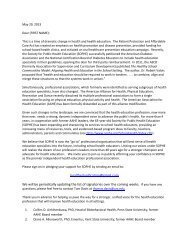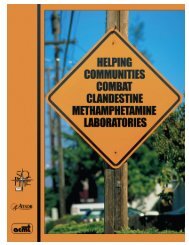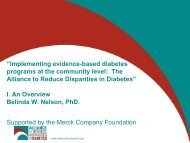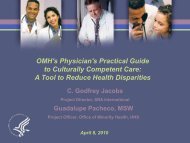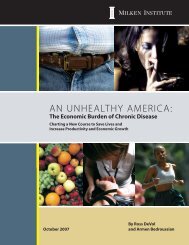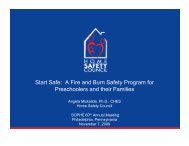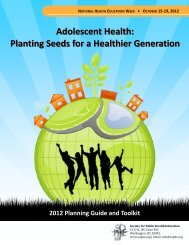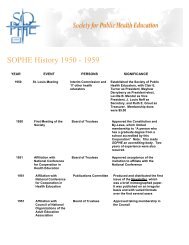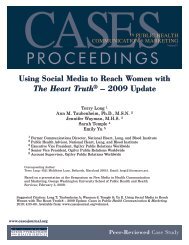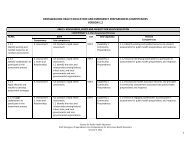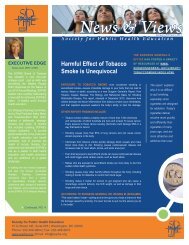to view the program - Society for Public Health Education
to view the program - Society for Public Health Education
to view the program - Society for Public Health Education
Create successful ePaper yourself
Turn your PDF publications into a flip-book with our unique Google optimized e-Paper software.
Workshop is aimed at providing <strong>the</strong> knowledge and skills <strong>to</strong>ward<br />
developing and sustaining effective partnerships with state health<br />
departments. Key resources and strengths of health departments at<br />
<strong>the</strong> state and local level in <strong>the</strong> area of chronic disease prevention and<br />
school health will be identified, as well as, approaches <strong>to</strong> accessing<br />
<strong>the</strong>se resources <strong>to</strong> support policy, environmental and systems change.<br />
How health departments function, approaches <strong>to</strong> working with health<br />
departments, and practical steps <strong>for</strong> making collaborations happen <strong>to</strong><br />
fur<strong>the</strong>r <strong>the</strong> mission of schools will be discussed. Successful examples<br />
will be shared of partnerships between individuals, schools and communities<br />
and health departments in <strong>the</strong> area of school health and<br />
chronic disease prevention.<br />
WORKSHOP 6A<br />
Introduction <strong>to</strong> Type 2 Diabetes Prevention and Control <strong>for</strong><br />
<strong>Health</strong> Educa<strong>to</strong>rs<br />
Alexis Williams, MPH, CHES, CDC/National Diabetes <strong>Education</strong><br />
Program<br />
Participants will learn about <strong>the</strong> evidence-based strategies <strong>for</strong> diabetes<br />
prevention and control and consider <strong>the</strong> implications <strong>for</strong> planning<br />
health education <strong>program</strong>s. Participants will also learn about <strong>the</strong> role<br />
of health care systems and community-based organizations in diabetes<br />
prevention and control ef<strong>for</strong>ts. The course will explore some of <strong>the</strong><br />
socioeconomic and cultural fac<strong>to</strong>rs contributing <strong>to</strong> diabetes-related<br />
disparities. It will introduce participants <strong>to</strong> resources that support<br />
health promotion ef<strong>for</strong>ts, especially those tailored <strong>for</strong> vulnerable populations.<br />
By <strong>the</strong> end of <strong>the</strong> course, participants will identify key areas<br />
where health educa<strong>to</strong>rs can make an impact on diabetes prevention<br />
and control.<br />
2:00PM- 6:00PM (Half Day Workshops)<br />
WORKSHOP 5B<br />
LGBT 101: Seeking Cultural Competency = Knowledge +<br />
Sensitivity + Action<br />
Sherri Paxon, MSPH, BS Medical Technology, NACDD<br />
This interactive session will give participants <strong>the</strong> opportunity <strong>to</strong> learn<br />
about <strong>the</strong> LGBT community and <strong>the</strong> impacts of societal exclusion,<br />
homophobia, heterosexism and discrimination on health equity. The<br />
social determinants of health will be discussed in relation <strong>to</strong> LGBT<br />
health inequities and a synopsis of current research will be given.<br />
Participants will learn about <strong>the</strong> LGBT community as a culture and<br />
how discrimination and homophobia impacts <strong>the</strong> mindset of LGBT<br />
individuals and communities. There will be opportunity <strong>for</strong> participants<br />
<strong>to</strong> assess personal thoughts and feelings about LBGT populations.<br />
Methods <strong>for</strong> implementing an LGBT-specific welcoming environment<br />
will be demonstrated and a variety of resources that aid in<br />
education, awareness, advocacy and action <strong>to</strong>ward health equity <strong>for</strong> <strong>the</strong><br />
LGBT community will be made available. The National Association<br />
of Chronic Disease Direc<strong>to</strong>rs (NACDD) <strong>Health</strong> Equity Council<br />
(HEC) is inclusive in its <strong>view</strong>s of health equity and recommends that<br />
all health professionals receive training in LGBT cultural competency.<br />
Both NACDD and SOPHE competencies specify <strong>the</strong> importance of<br />
cultural competency and tailoring messages <strong>to</strong> priority populations.<br />
NACDD encourages <strong>the</strong> development of approaches that take in<strong>to</strong><br />
account differences among populations and emphasizes <strong>the</strong> impact of<br />
socioeconomic and behavioral determinants of health disparities.<br />
2:00PM-5:00PM (Half Day Workshops)<br />
WORKSHOP 7A<br />
Telling your S<strong>to</strong>ry: The <strong>Public</strong>ation Journey Begins Here!<br />
Hec<strong>to</strong>r Balcazar, PhD, M.S, The University of Texas <strong>Health</strong> Science<br />
Center-Hous<strong>to</strong>n, School of <strong>Public</strong> <strong>Health</strong>; Leonard Jack, Jr. PhD,<br />
MSc, Xavier University of Louisiana<br />
This workshop will provide participants with <strong>the</strong> <strong>to</strong>ols and motivation<br />
<strong>the</strong>y need <strong>to</strong> turn <strong>the</strong>ir work in<strong>to</strong> something <strong>the</strong>y can share through<br />
publication. During this half-day workshop, participants will hear<br />
from experienced edi<strong>to</strong>rs/contribu<strong>to</strong>rs of public health journals and<br />
will learn <strong>the</strong> specific skills, challenges, and opportunities inherent<br />
in <strong>the</strong> publication process. They will learn that getting from that<br />
first draft <strong>to</strong> seeing it in print is a dynamic and evolving process.<br />
Understanding and engaging in <strong>the</strong> process of writing and publishing<br />
can be achieved through acquired skills, resilience in <strong>the</strong> process, and a<br />
willingness <strong>to</strong> respond <strong>to</strong> collegial and edi<strong>to</strong>rial feedback.<br />
WORKSHOP 6B<br />
Using S<strong>to</strong>rytelling <strong>to</strong> Promote Diabetes Prevention and Control<br />
Vulnerable Populations<br />
Alexis Williams, MPH, CHES, CDC/National Diabetes <strong>Education</strong><br />
Program; Randy Chat<strong>to</strong>, Empowering Ramah Navajo <strong>to</strong> Eat <strong>Health</strong>y<br />
by Using Traditional Foods Program; Lemyra DeBruyn, CDC Native<br />
Diabetes Wellness Program; Melinda R Frank, CDC Native Diabetes<br />
Wellness Program<br />
Workshop will address <strong>the</strong> principles of good s<strong>to</strong>rytelling, and provide<br />
ideas <strong>for</strong> developing and testing s<strong>to</strong>ries <strong>for</strong> use in health promotion<br />
<strong>program</strong>s. Participants will learn <strong>to</strong> think critically about <strong>the</strong> place <strong>for</strong><br />
s<strong>to</strong>ries in health promotion initiatives, and explore issues related <strong>to</strong> <strong>the</strong><br />
evaluation of s<strong>to</strong>rytelling. Participants will also learn about resources<br />
developed <strong>to</strong> support s<strong>to</strong>rytelling in diabetes prevention and control<br />
ef<strong>for</strong>ts in vulnerable populations. These resources include <strong>to</strong>olkits,<br />
films, children’s books, and pho<strong>to</strong>novellas, and have been developed<br />
<strong>for</strong> use in African American, Hispanic/Latino, and American Indian<br />
communities.<br />
SOPHE-NACDD 2011 Joint Academy and Midyear Scientific Meeting 17




